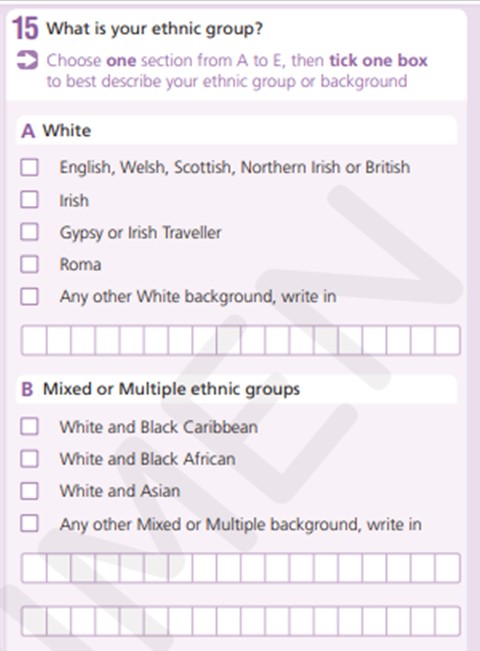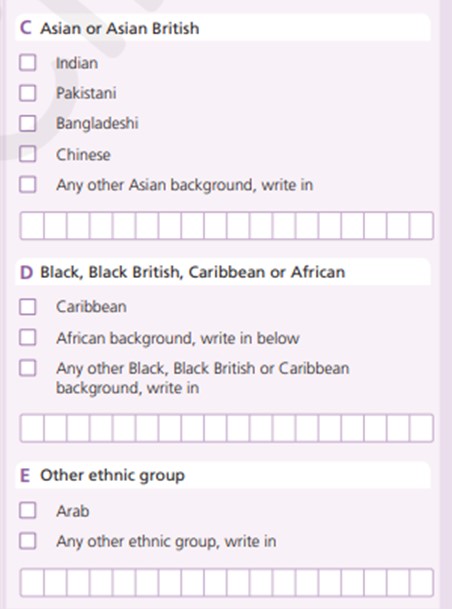Ethnicity in the 2021/22 Census
Ethnicity in the 2021/22 Census
What questions were asked on Ethnicity?
Questions about ethnic group were asked in all countries in the UK. England and Northern Ireland were the same.
|
|
 |
 |
In Scotland the categories for the White group included Scottish, other British, Polish and Showman / Showwoman. Mixed ethnic groups, African and Caribbean had a check box and were asked to write in more details. Wales had a reduced set but also included Roma and Filipino.
How do the questions transfer to variables and tables?
There are three variables identifying ethnicity. The most detailed will be based on the selection of a category and write in answers. This will only be available as univariate tables down to output area level subject to statistical disclosure control. The second will include 19 categories and the third 5 categories.
How does it compare to previous censuses?
Ethnicity will be cross-tabulated with age and sex, accommodation type, country of birth, age of arrival in the UK, occupancy rating, unpaid care and general health, dependent child by sex, gender identity, health and age, highest level of qualification, industry, language, national identity, occupation, sexual orientation and tenure (household reference person). It is not clear which of the two sets of categories will be used but the guidance for the flexible table builder uses the least detailed set.
What impact might the COVID pandemic have had on Ethnicity?
None.
Variables
Table 1 – ETHNIC_GROUP__TB_20B
Code Ethnicity
1 Asian, Asian British or Asian Welsh: Bangladeshi
2 Asian, Asian British or Asian Welsh: Chinese
3 Asian, Asian British or Asian Welsh: Indian
4 Asian, Asian British or Asian Welsh: Pakistani
5 Asian, Asian British or Asian Welsh: Other Asian
6 Black, Black British, Black Welsh, Caribbean or African: African
7 Black, Black British, Black Welsh, Caribbean or African: Caribbean
8 Black, Black British, Black Welsh, Caribbean or African: Other Black
9 Mixed or Multiple ethnic groups: White and Asian
10 Mixed or Multiple ethnic groups: White and Black African
11 Mixed or Multiple ethnic groups: White and Black Caribbean
12 Mixed or Multiple ethnic groups: Other Mixed or Multiple ethnic groups
13 White: English, Welsh, Scottish, Northern Irish or British
14 White: Irish
15 White: Gypsy or Irish Traveller
16 White: Roma
17 White: Other White
18 Other ethnic group: Arab
19 Other ethnic group: Any other ethnic group
-8 Does not apply
Table 2 – ETHNIC_GROUP_TB_6B
Code Country
1 Asian, Asian British or Asian Welsh
2 Black, Black British, Black Welsh, Caribbean or African
3 Mixed or Multiple ethnic groups
4 White
5 Other ethnic group
-8 Does not apply
